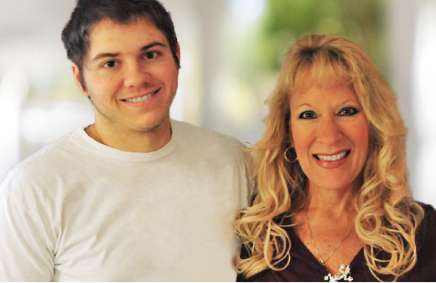Preparing for the future: the benefits of early diagnosis
December 1, 2020
With a family history of inherited retinal disease (IRD), Mary Lou Johnson Evans sought genetic testing for herself and her six-year-old son before any symptoms were present. That preparedness helped her understand available information and seek resources that her son would need one day.

At age six, Mary Lou Johnson Evans’s son Joshua was a happy, healthy child, with no indication that 15 years later he would start to have symptoms of retinitis pigmentosa (RP). The genetic mutation responsible for Joshua’s vision loss – X-linked RPGR/ORF15, for which there is currently no treatment – will eventually lead to complete blindness. But he and his mother have been ready for the onset of symptoms for years. As a child, Joshua was diagnosed through a genetic test and corresponding eye exam that confirmed the mutation causing his disease, well before he began showing signs of RP.
Mary Lou’s knowledge of her family medical history led her to proactively pursue genetic testing. Her brother was diagnosed with RP at age 20 and lost his vision at age 30. It was important for Mary Lou to understand whether she and her son had the gene for RP. Her local ophthalmologist referred them to a genetic testing and research facility, where Mary Lou shared her family history with a specialist. The necessary blood work was conducted to confirm what Mary Lou suspected. She was a carrier for RP, and Joshua tested positive for one of the gene mutations that cause RP. Although he wasn’t experiencing symptoms, and likely would not for several years, Mary Lou understood the complexities of her son’s disease and began to seek out resources that could educate her and prepare her with ways to best to support him.
Genetic testing, Mary Lou says, is simple and beneficial. The proper diagnosis was what Mary Lou needed to help her son understand his IRD and prepare for his future. Mary Lou’s brother could act as a resource to help her son prepare for a life with low vision as his symptoms began to show. Early on, Mary Lou’s brother suggested that Joshua learn braille. He tackled it in middle school and part of high school, taking a break at that time to pursue other interests with friends and peers. Learning Joshua’s mutation also allowed the family to gather more information and resources on his IRD. This guidance provided access to specialized support before the disease progressed. Genetic testing provided knowledge to Mary Lou and her son and gave them the foundation from which they could move forward, do research, and connect with others who have the RPGR/ORF15 mutation.
For people with a family history of IRDs, genetic testing can help you understand and prepare for your disease, even before you begin to show symptoms. This was essential for my son and me—to prepare for when he would lose his sight.”
Mary Lou strongly advocates for genetic testing, saying, “testing gives you guidance and information, so you can learn what to expect and stay informed as the disease progresses.” For example, she says, there are many different types of RP; knowing what type you have can help those affected clarify how to move forward. She encourages anyone with a family history of IRDs to speak to their doctor about genetic testing to confirm a diagnosis so any research or outreach they do is relevant and informative.
Now in his early 20s, Joshua experiences symptoms of RP. His nighttime vision is starting to change. Mary Lou continues to advocate for him. The family remains in touch with the specialist who initially diagnosed Joshua and has guided them on their journey. The knowledge of genetic testing helped prepare them for the future.
Finding a genetic counselor or other healthcare professional you trust offers the support your family needs when navigating the diagnostic process and continual IRD management.
Mary Lou is active within IRD-specific caregiver communities and she stays on top of advances in scientific research. Genetic testing helps her know what research might be relevant for her son. She’s optimistic about ongoing studies but is faced daily with the urgency for progress.
Sign up to find out when we add new stories to the site.
